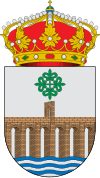Alcántara
| Alcántara | ||
|---|---|---|
| Municipality | ||

Convent of San Benito de Alcántara (16th century).
|
||
|
||
| Location in Spain | ||
| Coordinates: 39°43′20″N 6°53′23″W / 39.72222°N 6.88972°W | ||
| Country |
|
|
| Community |
|
|
| Province | Cáceres | |
| Comarca | Tierra de Alcántara | |
| Government | ||
| • Mayor | Luis Mario Muñoz Nieto | |
| Area | ||
| • Total | 552 km2 (213 sq mi) | |
| Elevation | 291 m (955 ft) | |
| Population (2009) | ||
| • Total | 1,653 | |
| • Density | 3.0/km2 (7.8/sq mi) | |
| Demonym(s) | Alcantareños | |
| Time zone | CET | |
| Website | Official website | |
Alcántara is a municipality in the province of Cáceres, Extremadura, Spain, on the Tagus, near Portugal. The toponym is from the Arabic word al-QanTarah (القنطرة) meaning "the bridge".
Archaeological findings have attested human presence in the area from the Bronze Age; the first historical inhabitants were the Lusitanians, followed by the Celts, who came from east to the Pyrenees. To this period, and to the following Roman domination, belong remains of several castra (military camps), villas and the bridge which gives its name to the city. The Roman rule lasted from the 2nd century BC to the 5th century, when they were replaced by the Visigoths.
In the 8th century the Arabs conquered the Iberian peninsula, including Extremadura. In the 12th century the Muslim geographer al-Idrisi described the bridge as one of the world's marvels. In the 12th-13th centuries Alcántara was a frontier city, devoted to military activities and animal husbandry. After the collapse of the Caliphate of Córdoba, it belonged to several Islamic taifas (petty kingdoms).
Ferdinand II of León occupied it in 1167, during his wars against Portugal, but later the town was recaptured by the Almohads. The Christians conquered it definitely in 1213 with Alfonso IX of León. In 1217 it was given to the military order of Calatrava. They however considered it too difficult to defend, and thus the following year they were replaced by the Order of San Julian de Pereiro, a military order created in 1156 and which had its headquarters on the Rio Cora and which later took its name from Alcántara, where they established. The city maintained its strategical importance until 1655, when Portugal was finally separated from Spain. In 1807, during the Peninsular War, it was occupied by the French troops.
...
Wikipedia


